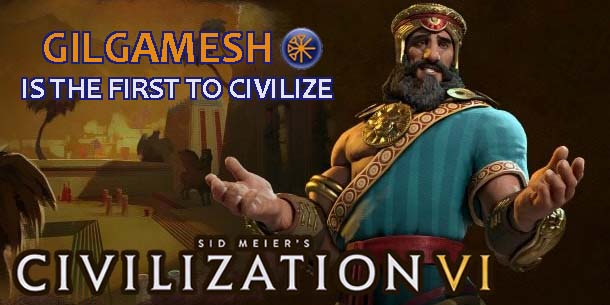
Sumer is one of the oldest civilizations known to have existed. The first permanent cities may have been settled along the Euphrates and Tigris rivers of Mesopotamia (modern day Iraq) as early as 5500 B.C., and written records date back as far as 3300 B.C.. The Sumerians were among the first adopters of agriculture, as the fertile floodplains of the "cradle of civilization" allowed for an abundance of food that enabled large, urban population centers.
Gilgamesh is an epic hero and king in Sumerian mythology. The Epic of Gilgamesh (transcribed in cuneiform on stone tablets) is the oldest surviving work of literature, and is credited as the world's first work of great literature. Copies of the poem were discovered in the ruins of the royal library of the Assyrian king Ashurbanipal. According to the epic poem, Gilgamesh was a demi-god who is best known for taming the wild, feral man Enkidu and forging a lasting friendship with him. The two adventured together many times before Enkidu was killed by the gods for defying their will and helping Gilgamesh to kill the sacred Bull of Heaven. The death of his friend sent Gilgamesh into depression, and he dedicated the rest of his life (according to the poem) to a futile search for eternal life. Scholars and historians originally dismissed Gilgamesh as a mythological figure, but archaeological finds suggest that he may have been a real historic king of Uruk sometime between 2800 and 2500 B.C.. Whether the stories are based on true events, or are purely myth, they can be seen as an allegory for civilization itself, which Sumer, and Gilgamesh, helped to establish.
DISCLAIMER:
Civilization VI is still very early in its life-cycle. Strategies for the game (and for specific leaders and civs) may change as Firaxis applies balance patches, introduces new features, or expands the game through DLC or expansion packs, or as the Civ community discovers new strategies. As such, the following strategy guide may change from time to time. I will try to keep it up-to-date, and will make notations whenever changes are made. I'll also post links in the official 2K forums and CivFanatics, where I'll also report any changes made. If possible and practical, I will try to retain the original content of the strategy for posterity.
I welcome any feedback or suggestions that readers wish to offer. Feel free to post on the linked forums, or by posting a comment at the bottom of the page.
This guide is up-to-date as of the December 2016 patch (ver. 1.0.0.56).
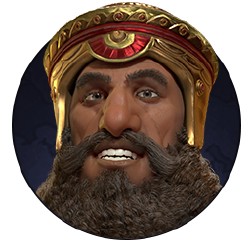
Gilgamesh might be a very good leader for beginners to the game. Gilgamesh encourages making friends and allies, and his uniques grant early game bonuses that will help new players get off to a good start. The bonus reward for clearing barbarian encampments will also help teach new players to build a sizeable early military and go hunting for barbarians, which is a good strategy for Civ VI in general, regardless of your leader or civ. So I recommend Gilgamesh as a good place to start, and he will be the subject of my first Civilization VI strategy guide! [More]
83c3f824-13a8-4896-8e42-7df26a0e763a|4|4.0
Tags:Sid Meier's Civilization, Civilization VI, Sumeria, Sumer, Gilgamesh, War Cart, Ziggurat, Adventures of Enkidu, Enkidu, Epic Quests, barbarian, outpost, tribal village, goody hut, warmonger, unique improvement, unique mounted unit, heavy calvary, horse, iron, donkey, science, culture, heavy chariot

Following up on my previous post about the Top 10 good ideas in Civilization V, here is a list of the opposite: the flaws and annoyances in the game's design that really grind my gears and make me nostalgic for the older games and wishing for dramatic changes in future sequels.
And since I'm always eager to provide constructive criticism where I can, I will propose ideas for addressing some of the problems with these features where relevant. The hope is that future games in the series will be able to learn from Civ V failures and successes and be better games.
Of course, any list of "good ideas" or "bad ideas" is going to be subjective. You may not agree with my opinions, and that's OK. If there's any features, mechanics, or design decisions that you really hate in Civilization V, its DLC, or its two expansions, please feel free to leave a comment!
... [More]
47a0e2f2-1d86-4631-864b-65698442a29f|1|5.0
Tags:Sid Meier's Civilization, civilization, Civilization V: Brave New World, retrospective, Civilization V: Gods & Kings, raze, capitals, insta-heal, lancer, chariot archer, scout, warmonger, tactics, Civilization V
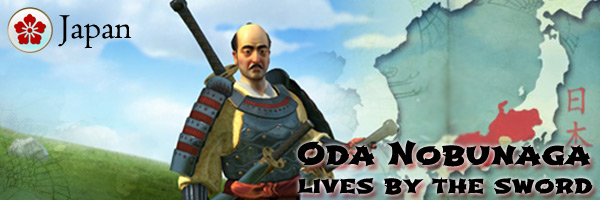
Continuing my series of strategy posts about Brave New World's modified civilizations, I'm going to take a look at strategies for Oda Nobunaga's Japan. Since Brave New World's Fall patch Japan was given additional buffs towards culture and coastal starts.
Japan is a series of four large island and numerous smaller islands that were formed by volcanoes. It has been inhabited since the upper paleolithic era (about 30 thousand years ago), and its people have lived in relative isolation for much of its history. It has gone through periods of war with its closest neighbors across the sea: China and Korea, and has had significant cultural influences from both, such native Shinto's two competing religions: Buddhism and Confucianism. Throughout most of Japanese history, the country has been in a feudal state, with regional populations being loyal to a warlord who is granted land and titles from the emperor (or "Shogun"). In-fighting between warlords was common, and power often ebbed and flowed between different clans and families.
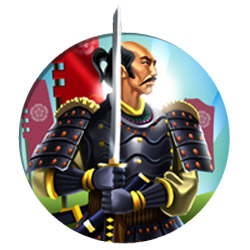
Samurai Daimyo Oda Nobunaga helped Ashikaga Yoshiaki to reclaim the title of Shogun for his clan in 1568, and Nobunaga used the leader as a puppet to enable his own conquests. He was a brutal warrior who once set fire to an enemy complex, killing tens of thousands of civilian non-combatants (including women and children) in order to put down a rebellion of farmers and monks. He eventually attained military control of more than half of the territories of Japan on behalf of the Shogun. His successor, Hashiba Hideyoshi, would complete the unification of Japan 11 years after political and personal tensions lead to Nobunaga's assassination by a vassal clan.
In the 19th century, Japan's isolation finally ended and it began the process of rapidly modernizing. By the 1930's, Japan had developed into a modern military-industrial machine that was almost the technological equivalent of the United States and European powers. It became the dominant power in the Pacific prior to being defeated by the United States in the second half of World War II. [More]
1cad9ae0-1148-4d92-80d2-cc7859222fda|3|5.0
Tags:Sid Meier's Civilization, Civilization V: Brave New World, Civilization V, Japan, Oda Nobunaga, Bushido, daimyo, shogun, Zero, culture, tourism, sea resources, fishing boats, sushi, longswordsman, fighter, warmonger, samurai, Civ V Fall Patch, Civ-V
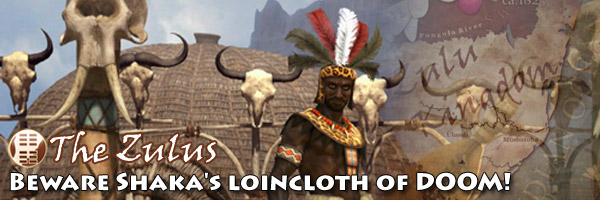
Rounding out my series of strategy posts about Brave New World's new civilizations, here is the Zulu. But first, I want to take a moment to thank the readers and everyone who has provided feedback and constructive criticism for these posts. When I first started with Assyria, I wasn't sure if I'd bother doing any other civs at all - let alone all of them! But people read the posts and encouraged me to keep writing them, and now they are among the most popular posts on this blog! I have been very humbled and gratified with the responses that I have received. I'd like to specifically thank all of those who posted suggestions and feedback on the forums. I really appreciate your participation. Many of your ideas and strategy alternatives have been incorporated into revisions of these posts, and I've taken your criticisms to heart in writing the subsequent posts. I'd also like to thank the fine folks at PolyCast, who have taken the time to discuss and publicize these posts, as well as provide additional feedback. Keep up the good work!
As for my future plans: I expect to take some time away from Civ to catch up on some other games, like Dark Souls II and some Steam games that I've had sitting on my computer for a while (like Europa Universalis IV). I also intend to get back into modding and some other personal projects. This does not mean that I am completely done with Civ V strategies though. I do intend to look at some of the civs whose strategies were significantly changed by the Brave New World expansion (particularly France and Arabia, whose uniques were redesigned). I will continue to write strategies as time permits, and will continue to check the forums and comments and possibly update these posts if readers provide new insights. Thanks again, and keep on Civin'!.
Now, without further ado, the Zulu!
Little is known about the regions of southern Africa prior to European invasions and colonization. The region was divided up into small tribes and kingdoms, but they kept very few written records of their histories. In the early 19th century, the Zulu Kingdom (lead by Chief Shaka) came to dominate large chunks of the eastern coast of southern Africa. Shaka's successors expanded the kingdom through wars with rival tribes and European settlers for almost a century before the British offered an ultimatum in 1878 to King Cetshwayo regarding a territory dispute between the Zulu and the Boers (Dutch settlers in Africa). Cetshwayo rejected the terms of the ultimatum, leading to the Anglo-Zulu war. The Zulu won an early victory, overwhelming the British with their tactics and sheer numbers, handing the British their single worst defeat to a native African fighting force. In the long-term, however, the Zulu were incapable of standing up to the British army that was equipped with firearms. The British sieged the Zulu capital, Ulundi, exiled King Cetshwayo to Cape Town, and divided the Zulu Empire into 13 "kinglets". This lead to internal conflict between the kinglets, forcing the British to reinstate Cetshwayo as the King of the Zulu. But conflict continued, and Ulundi was again sieged by one of the kinglets and Cetshwayo was killed. When the Union of South Africa was formed, the Zulu Kingdom stopped being recognized as a sovereign power, although several Zulu kings did retain significant influence in the region through the middle of the 20th century.
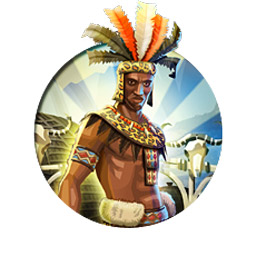
Shaka kaSenzangakhona was the first King of the Zulu Empire. He united several small tribes and then initiated significant military, spiritual, and cultural reforms. He used innovative and highly-aggressive military tactics to conquer neighboring tribes and establish the Zulu Kingdom as a dominant force in the southern Africa region. He was a brutal and efficient leader and introduced the iklwa stabbing spear and large cowhide shields that allowed his soldiers to quickly surround their enemies and engage in visceral close-quarters combat. His impi soldiers employed a novel "bull horn" formation consisting of three parts:
- the "chest" was the main force composed of senior soldiers who would engage the enemy to keep them pinned and immobile,
- the "horns" were squads of young, fast warriors who would flank the enemy that was engaged with the chest,
- and the "loins" were a reserve force behind the chest and with their backs to the battle who would defend the army from flanking maneuvers and chase down escaping enemies.
These tactics proved incredibly useful to Shaka and to his successors (even against the muskets of European invaders), and it was even used to crush the British in the opening battle of the Anglo-Zulu war. However, these tactics could not survive against the killing efficiency of more advanced firearms and cannons and were eventually abandoned. [More]
6c911954-01d0-47d1-9bc6-d03b1185221c|9|5.0
Tags:Sid Meier's Civilization, Civilization V: Brave New World, Civilization V, Zulu, Shaka, Iklwa, Ikanda, Impi, spear throw, unit maintenance, war, warmonger, promotion, buffalo, buffalo horns, buffalo chest, buffalo loins, melee, flanking, Africa, barracks, pikeman, Civ-V
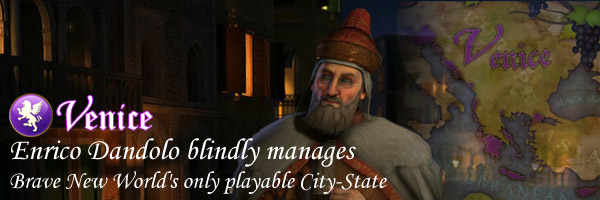
The penultimate entry in my series of strategy posts about Brave New World's new civilizations will focus on the very unique civilization of Venice: the playable City-State.
The city of Venice is one of the most architecturally astounding cities in the world. It is built on top of 118 small islands in the marshy Venetian lagoon. These natural and artificial islands are separated by a network of canals that run through the city and act almost like a network of roads. Many of the buildings and paved surface roads and walkways are built on top of stilts that emerge from these shallow canals and the city contains over 400 bridges. Historically, most of Venice's traffic has been through the waterways (via gondole) or on foot, but the modern city does have a contemporary road network (although a very compact one) intended for automobiles. Due to its unique environment and construction, the city is an astounding work of engineering art in and of itself.
There are no surviving historical records depicting the founding of Venice, but historians believe that the islands were originally settled by refugees from Roman cities during the Germanic and Hunnic invasions between 400 and 600 C.E. Venice began to expand its international influence prior to the thirteenth century by battling pirates that were plaguing trade in the Adriatic and Mediterranean. The city-state began to become an influential economic force in the region due to its position as a hub for trade between Europe and the Middle East, and Venice non-violently acquired control over many islands of the Aegean, including Cyprus and Crete. Failed military actions and the devastation of the black plague in the fifteenth century lead to the decline of the Venetian empire, and Venice was eventually conquered by Napoleon, then surrendered to Austria in the terms of a peace treaty, then conquered again by Italy during its war of independence. Fortunately, Venice was spared from attack during World War II, and so much of its historical architecture has remained intact, making it a popular tourist destination today.
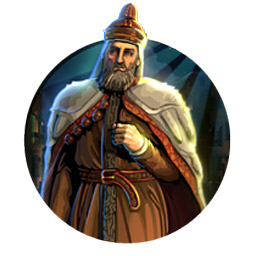
The 42nd Doge of Venice, Enrico Dandolo is known mostly for his blindness. There are conflicting stories regarding how Dandolo became blind. The decreasing legibility of his signature between 1174 and 1176 implies that he became blind gradually, possibly due to an injury sustained in Constantinople. He was also a very pious leader who provided invaluable assistance to the knights of the Fourth Crusade and played an integral part in the eventual sacking of Constantinople. Despite his blindness, Dandolo survived into extreme old age, being almost a hundred years old (by some estimates) at the time of his death in 1205. He was buried in the Hagia Sophia in Constantinople, but his original tomb was destroyed by the Ottomans when they captured Constantinople (renamed it Istanbul) and converted the Hagia Sophia into a mosque.
Venice was a City-State in Gods & Kings but was promoted to a full civilization for Brave New World. Venice doesn't expand like a traditional civ in Brave New World; instead, it buys control of fellow City-States or expands its influence via conquest, both of which are funded by its excessive trade routes. [More]
68d21b21-5812-4863-90c6-b12e9b6ac21b|13|4.9
Tags:Sid Meier's Civilization, Civilization V: Brave New World, Civilization V, Venice, Enrico Dandolo, Serenissima, Merchant of Venice, Great Galleass, trade, trade route, caravan, cargo ship, navy, puppet, warmonger, gold, commerce, Great Merchant, galleass, city state, capital, Civ-V
|

| 12 | | | | | | | 60 | | 11 | | | | | | | 55 | | 10 | | | | | | | 50 | | 09 | | | | | | | 45 | | 08 | | | | | | | 40 | | 07 | | | | | | | 35 | | 06 | | | | | | | 30 | | 05 | | | | | | | 25 | | 04 | | | | | | | 20 | | 03 | | | | | | | 15 | | 02 | | | | | | | 10 | | 01 | | | | | | | 05 |
|